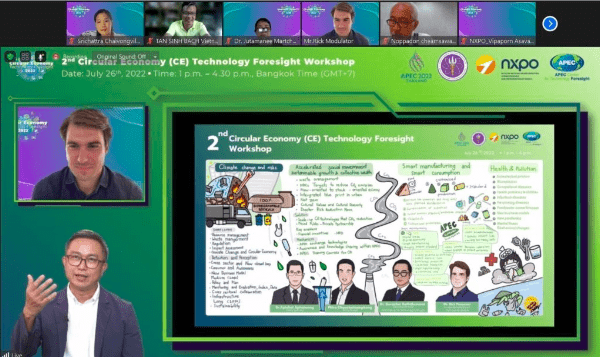Circular Economy Technology Roadmap in APEC

Co-sponsoring economies: Chinese Taipei, Chile, Indonesia
This project is aimed to identify key issues, solutions, and driving mechanisms which are used to formulate a roadmap for circular economy (CE) transformation in the Asia-Pacific region. An interactive process is set up, that combines creative workshops and sharing sessions with program development activities. More than 60 participants from APEC economies including Thailand, Hong Kong, Indonesia, Vietnam, Cambodia, the Philippines, Japan, Brunei Darussalam, Russia and the US participated in the project.
The 1st Circular Economy Technology Foresight Workshop was held virtually on May 2022. It aimed to disseminate information and identify the global trends and market opportunities pertaining to circular economy, encouraging the science, technology, and innovation collaboration in APEC economies. A richness of inputs was gathered and discussed in various canvasses. The following central topics were extracted from the workshop discussions: 1) health & pollution, 2) accelerated social movement, sustainable growth & collective wealth, 3) climate change & risks, 4) smart manufacturing & smart consumption, 5) food safety & security, 6) resource scarcity & security, 7) globalization / localization, and 8) emerging, transformative technology platforms
For the 2nd workshop, held virtually on July 2022, participants were split into eight discussion groups according to the central topics obtained from the 1st workshop. Each discussion group delved into key issues in each area from describing the problems and identifying challenges and opportunities, to suggesting short-, medium- and long-term solutions, designing supportive policy and legal framework as well as creating mechanisms for APEC collaboration. The brainstorming session yielded several interesting recommendations. The health and pollution group considered air/water/soil pollutions as major issues and suggested an establishment of key infrastructure such as recycling centers at the community and regional level, biorefinery, bio foundry and big data centers. The climate change and risks group viewed CE innovation ecosystem as a key issue and recommended a policy on renewable energy appliances, a roadmap for fast-moving consumer goods and a strategic plan for CE transformation. The groups on food safety & security and resource scarcity & security identified recycling as a solution to resource scarcity and suggested plant-based meat and alternative protein to solve food security problem with synthetic biology as a potential research topic for APEC collaboration.

After analyzing and synthesizing information obtained from both workshops, a list of potential collaborative projects was identified, and discussion sessions were organized to form partnership for selected projects.
